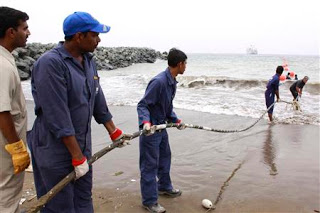Ben Uzor Jr
Despite the enormous bandwidth capacity sitting on the
country’s coastline, majority of the Nigerian populace are been starved of
broadband Internet, Funke Opeke, chief executive officer, MainOne Cable Company
told newsmen in Lagos recently. At the moment,
there are four active undersea cable systems ((MainOne Cable, Glo-1, MTN’s WACS
and NITEL’s SAT-3) in the country. The existing submarine cables in Nigeria
carry an installed capacity of over 19.2 terabytes, about 340 gigabyte
combined, a significant increase in the capacity available to drive bandwidth
dependent services. Opeke, however pointed out that only about five percent of
the bandwidth capacity available on MainOne cable is currently being utilised, leaving
95 percent of the capacity redundant but available for use.
Speaking at an interactive session with journalists,
Opeke blamed the poor utilisation of the cable on the absence of distribution
and last mile infrastructure required to move available bandwidth capacity
across the length and breadth of Nigeria. If Nigeria is to enjoy the benefits
of broadband, she said regulatory and legislative interventions were required
to address these challenges. Nigeria’s telecommunications market, according to
her requires a well-rounded infrastructure sharing framework to encourage new
entrants and stimulate investments in broadband in order to harness its
potentials for wealth creation and economic development. “We strongly believe
that it’s something government can set up in less than 60 days. It does no
require years of study”, she stated.
The cost of moving internet traffic from Lagos to Abuja,
according to her is four times higher than the cost of moving the same level of
traffic from Lagos to London. This, she went on is because operators with huge
fibre infrastructure have not embraced infrastructure sharing. Besides, those who
have offer services at unfair and prohibitive prices. “Looking at the cost and
competition policy under the Communications Act, there is absolutely no need
for that pricing mechanism. We need to have more infrastructure sharing. “If
people who build the infrastructure are running it over public right-of-way,
and have received tax concessions to build those networks, I see no reason for
such pricing mechanism.
“If private sector has built the infrastructure, then
they certainly should make it available to others operators and networks on a
fair and non-discriminatory basis. The federal government has done nothing
about this so far”, the MainOne CEO added. Business Day learnt that there is
more than 30,000 kilometres of domestic fiber optic cables to connect those
international cables to more than 50 percent of the Nigerian population. But
from all indications access to them is so far discriminatory and inordinately
expensive. This, according to industry watchers has inhibited access for most
Nigerian schools, hospitals, government agencies, young professionals and small
and medium businesses.

No comments:
Post a Comment